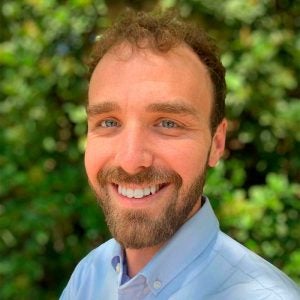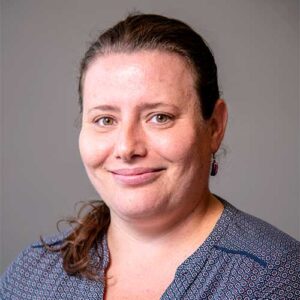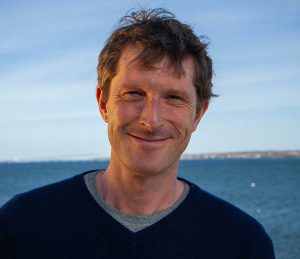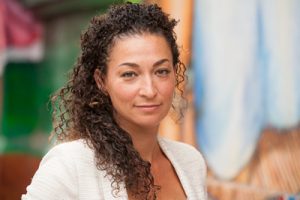The CI provides a range of grants to invest in multidisciplinary research and outreach in keeping with its mission. Grants are evaluated on the basis of how the investment enhances the efficacy of pure and applied research relative to the state of the coastal zone. Application is open to CI Senior Fellows on a rolling basis.
2023-2024 Catalyst & Leverage Grant Awardees:
 Visualizing Stormwater Infrastructure: A Digital Walking Tour at Roger Williams Park – $5,000
Visualizing Stormwater Infrastructure: A Digital Walking Tour at Roger Williams Park – $5,000
Professor Madison Jones, URI Harrington School of Communication and Media
In collaboration with the Stormwater Innovation Center (SIC), DWELL Lab is developing an augmented reality (AR) walking tour to highlight the center’s work with urban stormwater infrastructure. The tour will take place along the 1.25 mile loop around Roosevelt Lake in Roger Williams Park (RWP) in Providence. Plagued by poor water quality and eutrophication, many of the water bodies at RWP are remediated by PSIC’s stormwater best management practices, or BMPs. In fact, there are 35 structural and non- structural stormwater BMPs installed in Roger Williams Park, at least five of which are installed at Roosevelt Lake. The paved path along Roosevelt Lake is accessible for wheelchair users and open to the public. This funding will allow us to hire a graduate student to produce content for the beta version of the tour, which will serve as “proof of concept” for future funding.
 Assessing PFAS Bioaccumulation in Shellfish Species from Narragansett Bay: Implications for Environmental Monitoring and Restoration Efforts – $5,400 Professor Jitka Becanova, URI Graduate School of Oceanography
Assessing PFAS Bioaccumulation in Shellfish Species from Narragansett Bay: Implications for Environmental Monitoring and Restoration Efforts – $5,400 Professor Jitka Becanova, URI Graduate School of Oceanography
The overall project focuses on utilizing novel passive samplers as biomimicking tools to predict the bioaccumulation of a broad range of PFAS in both wild and aquaculture shellfish harvest in Narragansett Bay. The catalyst project contributes to this overarching objective by serving as a pilot study aimed at understanding the bioaccumulation potential of various PFAS in different species of shellfish. In order to accomplish this goal, we will collaborate with our partners to collectsamples of various shellfish species from Narragansett Bay. These samples will be analyzed to determine PFAS concentrations andpatterns, allowing us to identify similarities and differences among the species. Building upon the findings of this pilot study, we will selectrepresentative species for the main project, wherein we will comprehensively characterize the environmental factors that influence PFAS uptake. This characterization will be conducted through laboratory and field experiments. Additionally, we will modify materials that mimic PFAS patterns in these species, further enhancing our understanding of their bioaccumulation mechanisms.
 Applied Research for Surf Ecosystem Management – $5,000
Applied Research for Surf Ecosystem Management – $5,000
Peter Freeman, Coastal Research Associate, URI Coastal Resources Center
Surfing is an important cultural, recreational, and economic activity that has increasingly been leveraged to mobilize people andresources to protect surf ecosystems threatened by climate change and coastal development. At the same time, an international community of surf researchers has been emerging to support surf ecosystem management, but the discipline is in its infancy and only starting to align with funding agencies and NGOs. This funding will catalyze interdisciplinary work and partnerships between CI Senior Fellows and external entities by detailing aportfolio of applied research activities that a broad consortium of collaborators are standing by to pursue given the opportunity. This type of document would be of great value in reactive and proactive funding situations alike, with the Belmont Forum illustrating the former and the latter being more typical of private sector and NGO partnerships.
 Augmenting Manissean Public Memory on Block Island – $7,500
Augmenting Manissean Public Memory on Block Island – $7,500
Professor Amelia Moore, URI Department of Marine Affairs
This grant will leverage our progress on an interactive digital exploration of one of Rhode Island’s least known communities and histories: The African American and Indigenous families that have called Block Island home for generations. Most members of the public and residents of Block Island know very little about the last several hundred years of African American and Indigenous experience on the island, because this history is not included in most publicly accessible historical narratives and popular stories about the island, nor is it visible in the island’s landscape or at most points of public interest. In the summer of 2023, our interdisciplinary team began testing our concept with the development of one augmented reality (AR) point of interest on the island, the reimagination of the Fort Island Monument. The original monument, dedicated in 1946 by the Block IslandHistorical Society, describes the removal of Indigenous people from the island, alludes to “Indians” and their “shell heaps,” and celebratescolonial settlement. Our AR redesign of the monument inscribes it with new language, written in close partnership with an Afro-Indigenous family that retains generational property on Block Island, the Gobern family.
